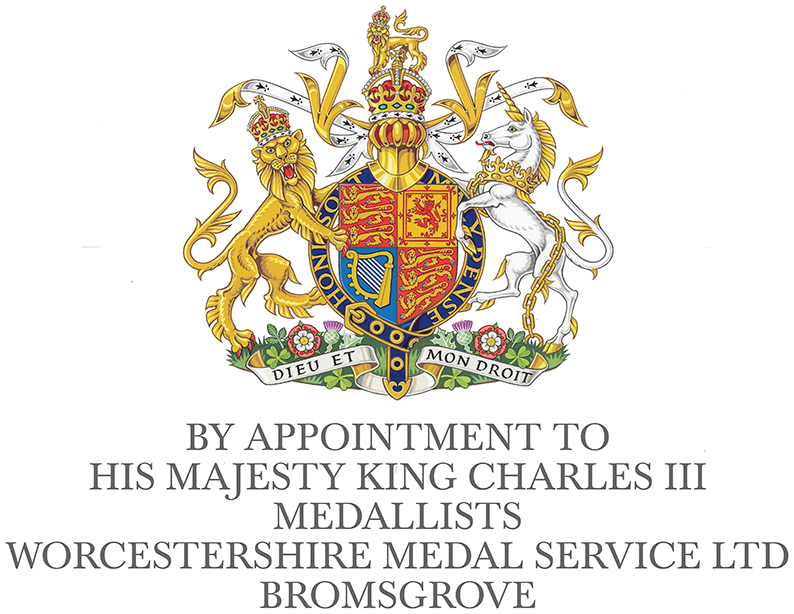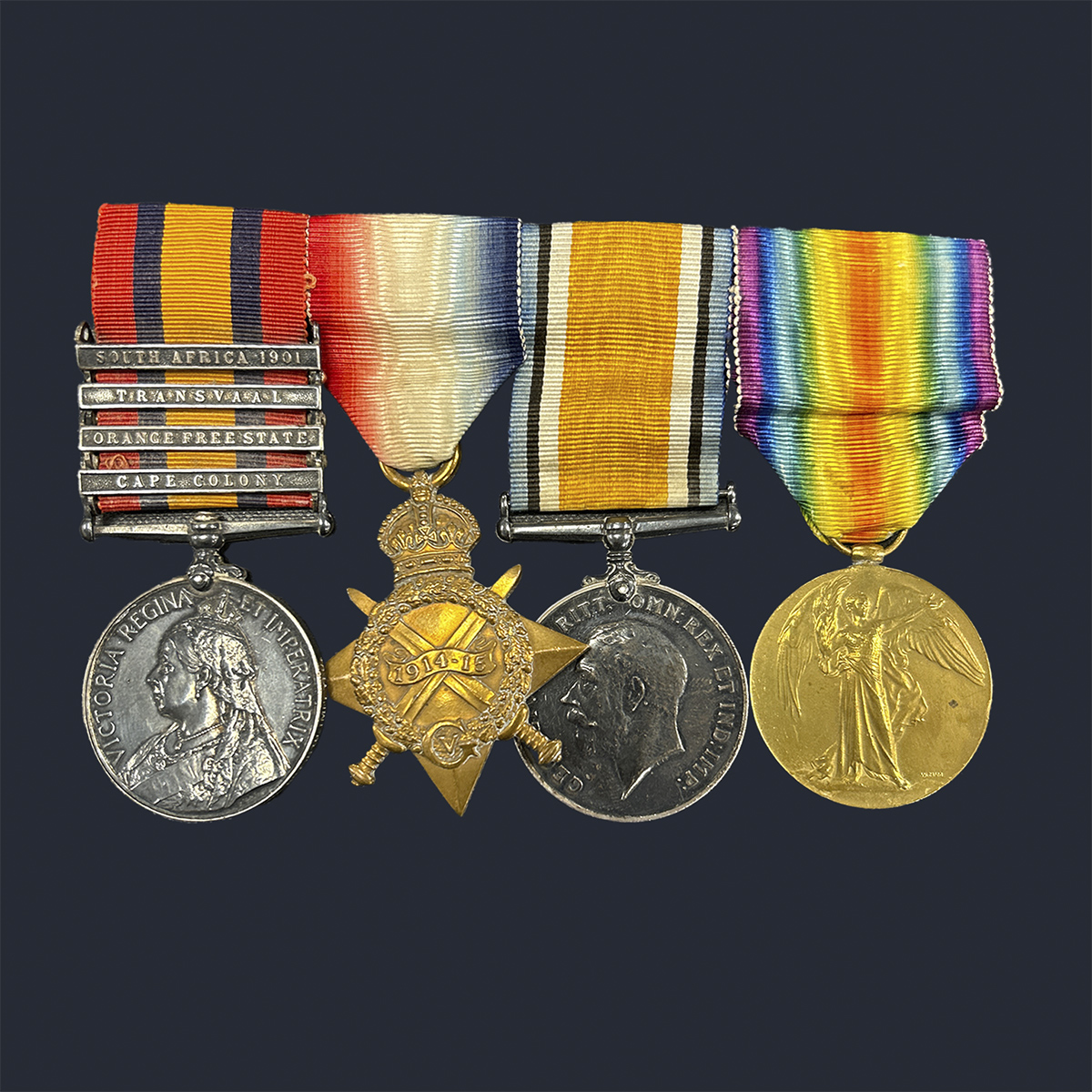Reminiscent of Mr Chips
Queen's South Africa 1899-1902, 4 clasps, Cape Colony, Orange Free State, Transvaal, South Africa 1901 (2644 PTE G.K.M.HUTCHINSON 23RD COY,8TH IMP.YEO.); 1914-1915 Star (CAPT.G.K.M.HUTCHINSON.D.OF.CORN.L.I.); British War Medal 1914-1920, Victory Medal 1914-1919 (CAPT.G.K.M.HUTCHINSON.)
Reminiscent of Mr Chips – a life dedicated to educating others.
George Knight McGowan Hutchinson was born in the Parish of St. George’s, Manchester on 24 May 1870 the son of Mary Newall Hutchinson (born Thorburn) and her husband William, a Railway Clerk by occupation. From an early age it became obvious that George, a studious child, was destined for a life in education.
Our first exposure to him comes via the 1871 England census where, at the tender age of 10 months, he was living with his parents at his grandmother’s residence (which doubled as a school) – 59 Park View Ladies School, Manchester – Mary Thorburn was a widowed Schoolmistress who had provided accommodation to her daughter Mary, a Music Teacher, her son-in-law William, a Railway Clerk, and their children – the aforementioned George along with his siblings Antonia (5) and Albertina (9).
Ten years later, at the time of the 1881 England census, William Hutchinson had taken his family to live at 17 Hampden Road in Bolton. His fortunes had changed along with his job - he was now a Waterworks Superintendent. Antonia was an Apprentice Dressmaker (15), George (10) was at school and there had been new additions to the family in the forms of Mary (8), Emma (7), Etthel (5) and Wilfred (4). Of servants there was no sign.
The dawn of 1891 revealed little changed in George’s domestic situation. Now 20 years old, he had extended his schooling beyond the secondary level and was a Student at a Training College. At the time the census enumerator called round the Hutchinson family were living at 4 Marlborough Street, Little Bolton. As if to prove that a love of teaching coursed through the family’s veins, sister Mary was a Pupil Teacher.
As the end of the 19th century neared George, along with millions of others, could have been forgiven for not giving a thought to affairs happening far away in South Africa. Tensions in that part of the world had been escalating for some time between Great Britain and the two Boer Republics bordering her colonies of the Cape and Natal. The Transvaal and the Orange Free State, fighting to protect their sovereignty as they called it, declared war on 11 October 1899 with their Commandos crossing the borders into British territory the next day.
The British military presence in South Africa at the time was woefully inadequate to stem the Boer tide and, initially, a series of military reverses took place, known as Black Week, where the Boers gained the upper hand. Alarm bells went off in Whitehall and, before long, a call went out for the creation of an Imperial Yeomanry – an army of non-regular citizen soldiers – to help bolster the numbers and take the fight to the Boers.
In no time at all the Recruiting Offices set up around the country were overflowing with recruits from all walks of life. Filled with patriotic zeal, the initial contingent was made up of altogether a superior stamp of man – those who came from the gentry, the Clubs of London and men who were educated and sophisticated. It was to this class of man that a 29 year old George Hutchinson belonged. A Chemistry Instructor by occupation when he walked into the Recruiting Office in Manchester on 4 January 1900, he was determined to make a difference and take the fight to “Brother Boer”.
Physically he was described as being 5 feet 6 inches in height, weighing 150 lbs and with a fair complexion, blue eyes and fair hair. He had a small scar on the right side of his nose and having been found Fit by the Doctor, was assigned no. 2644 and the rank of Trooper with the 23rd (Duke of Lancaster's) Company, 8th Battalion, Imperial Yeomanry.
After a few days of kit issue and instruction his battalion put to sea and, having arrived in Cape Town, disembarked and were sent up to the front by rail.
The best way to describe a man’s war is in his own words and Hutchinson happily obliged by writing to his father about his experiences. In a letter home entitled “Trooper Hutchinson’s Narrative” which appeared in the Bolton Evening News of July 3rd 1900 he wrote:
“Faber’s Spruit, 29 May 1900 – We are encamped in the wilds on a large rebel farm which we seized on Saturday. Of course we have no tents, nor have we had for some weeks. We are on very short commons – four biscuits per day, in fact we are half starved and are beginning to look a trifle pinched. When we arise from our downy couch on the ground in a morning we are simply frozen. I never experienced such cold nights. We made a successful reconnaissance in force yesterday and located the enemy at Campbell. We had no casualties. Sir Charles Warren showed splendid generalship. I expect we shall attack their position tomorrow, I may get hit as I have a white pony. We have sentry duty about every other night and any amount of patrols. We are working north and shall probably be out of the world for months yet.”
“30.5.1900 – Surprised by Boers. Beat them off after heavy fighting Orrell killed. Poole wounded. 24 killed and 23 wounded.”
“Faber’s Putts 2.6.1900 – Since I wrote my last (Sunday) we have been fairly in it, and I personally never felt the pressure of life so keenly as I do at present. Dawn was just appearing on Wednesday morning last when I raised my head and looked round preparatory to throwing off my blanket and getting up. A few seconds afterwards everybody was rudely aroused by the sound of a sentry’s rifle followed instantly by a deafening fusillade from every point around the camp. We were surrounded and surprised! The enemy knew the exact position of our men and horses and were firing at us for all they were worth, within 20 or 30 yards in some places. They had crept in between our outlying picquets and had posted themselves under cover all around us.
There was no panic or shouting; each man at once crawled to the rifles and grabbed his bandolier, and in extended order rushed forward a few yards and dropped flat. By this time men were falling fast, and one could see in the grey light, men in the agonies of severe wounds or death. For nearly half an hour we had to be on an exposed piece of ground, subjected to a perfect hail of bullets, from four different points. Then we gradually advanced taking cover where we could, and drove the enemy on our flank from their points of vantage. Our horses were all gone, having been stampeded by the Boers at the commencement of the action.
After two hours we made them run, and had breathing time to look round. I was most relieved to see Wilfred and most of our troops near at hand all right but was grieved to hear that Percy Orrell was killed and Ted Poole wounded. My worst injury was a graze on the finger and a few scratches from splinters of stones and bullets. While lying on my face I tried to distinguish the sound of the different kinds of bullets. One could hear the whistle of the Mauser, the whizz of the roughened Martini, and the pop of the deadly explosive bullet. The wounds afflicted by the two latter were fearful to look upon. When the enemy began to clear out of the garden we poured volley after volley into them, and dropped a good many. As soon as “cease fire” was given we managed to get about 20 horses and a party, of whom I was one, dashed out of camp to warn the post at Steyn’s Farm - 10 miles away. We got there all right and found them on the alert having heard the firing from the first. We returned safely to camp, bringing in two prisoners.
On my return I had the unpleasant task of assisting to bury our dead, to the number of 19 (several have since died). General Warren read the service, and poor man, nearly broke down. We have now got the camp in to a state of defence, and each man is on guard two nights out of three. We sleep with our bayonets and bandoliers on, and our rifles by our side. We stand to arms every morning before dawn and line the trenches until full daylight. On sentry in the garden, where we buried the dead, one had the frequent unpleasant experience of tumbling over the Boer dead in the night. We buried their dead yesterday and found that most of them had identification papers signed at Pretoria. Most of those who attacked us had been in the sieges of Kimberley and Mafeking.
The day after the battle I was one of an escort under Lieutenant Hardcastle to an empty convoy returning to Kimberley. We took them to Schmidt’s Drift, 12 miles from here. We were lucky to get through in the daytime, but our return was much more hazardous, as it was dark and the Boers were on the lookout. However our guide cleverly got round them by taking us some miles up a rocky watercourse in Indian file. They had given us up when we got back to camp at 9 p.m. – seven hours late and starving!”
Even allowing for an element of exaggeration “to impress the folks at home”, there can be no doubt that Hutchinson was in the thick of things – a far cry from the creature comforts of the school room and home. After serving a year and 118 days under the blazing African sun, his term of engagement was over and he was repatriated to England on 9 June 1901.
In an eerie twist of fate, the very next number after Hutchinson’s -2645 - belonged to the Percy Orrell referred to above. His papers state that he was Killed in Action at Douglas (Northen Cape) on 30 May 1900.
Returning home, Hutchinson was awarded the Queens Medal with the relevant clasps for his service. He resumed his work in the field of education and tied the marital knot with Lily in London in 1907. By the following year he was the Principal of the Paragon Commercial and Art Centre in New Kent Road, Bermondsey, London – under the auspices of the London City Corporation.
With the dawn of the 1911 census – Hutchinson, his wife and daughter, were living at 29 Ravensdale Mansions, Crouch End, London. There would have been no thought given to the potential of another war and yet this what the world woke up to on 4 August 1914. Britian was at war with Germany. Hutchinson knew where his duty lay. Wasting no time he applied for and was granted a commission in, first, the East Surrey Regiment and then the Duke of Cornwall’s Light Infantry. Embarking for France on 24 July 1915 he was to serve 2 years and 8 months before returning to England. For his efforts he was awarded the 1914/15 Star; War Medal and Victory Medal.
According to the 1939 Register, Hutchinson was a Retired Schoolmaster living at 142 Chesterton Road, Cambridge. He passed away at that address on 13 January 1948 at the age of 77 and was survived by his daughter Adeline who was also the beneficiary of the £313 in his estate. The headmaster had retied for the last time.

